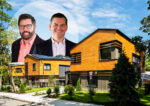Millennium Partners’ Winthrop Center landed its passive house certification, making it the world’s largest office building that meets the sustainability standard.
The Passive House Institute awarded the tower at 115 Federal Street its new title, verifying that it meets stringent energy efficiency requirements. Millennium, a New York City-based developer led by principals Chris Jeffries, Philip Aarons, Philip Lovett, Mario Palumbo, Richard Baumert and Steven Hoffman, also received a Gold-level WELL building certification and a Platinum WiredScore certification for Winthrop Center.
A typical Class A building in Boston’s existing stock uses 150 percent more energy and existing LEED Platinum buildings in Boston use 60 percent more energy than Winthrop Center’s office space.
Aside from the accolades, and more important for the bottom line, the 691-foot tower is winning over Boston office tenants in a down market.
“We saw the largest lease that’s been signed in all of Boston,” said Brad Mahoney, the firm’s director of sustainable development. He was referring to the 138,000 square feet Deloitte signed for in the tower this summer. That’s in addition to Cambridge Associates’ 116,000 square feet, McKinsey’s 95,000 square feet, Income Research Management’s 40,000 square feet and ECG Management’s 10,000 square feet.
It was the first passive house development for Millennium; Baumert said it likely won’t be the last.
“We’re all in on passive house,” he said. “It’s sort of the responsibility we have. This is what we need to do in the development community.”
Fierce Competition
Millennium’s decision to build a passive house office tower traces back to a fierce competition for a coveted slice of the city’s Financial District in 2016.
The Boston Redevelopment Authority was shopping around a shuttered garage and developers were piling on the bids. Trinity Financial, Lendlease, Hudson Group and Accordia Partners all waved their checkbooks at the city, but Millennium’s $151 million offer for the site more than doubled the next best offer, the Boston Globe reported.
“I actually would have been shocked if they’d gone with anyone else,” Northeastern architecture professor George Thrush told the outlet when Boston announced Millennium had won the site.
“Even if the money were equal this would still be one of the two best options. And the money’s not equal.”
Part of Millennium’s plan to set them apart from the competition was the passive house certification, Baumert said. The project’s architects, New York City-based Handel Architects, were finishing the Passive-certified House at Cornell Tech, a 26-story student housing tower on the Roosevelt Island campus. Handel proposed making Winthrop Center Passive as well.
“We had never thought of doing passive house,” Baumert said. “This was a way for us to address health, wellness, occupant happiness and productivity.”
The sustainability element of the tower’s design is also an attraction for tenants, Baumert said. Employers increasingly want climate-friendly offices to appeal to their employees.
“Everyone wants to feel like they’re making a difference,” he said.
Read more



